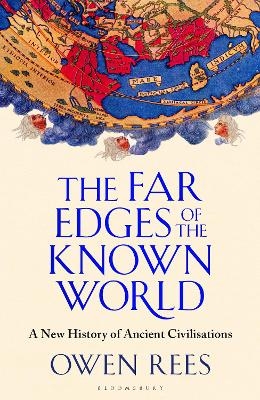
The Far Edges of the Known World
A New History of the Ancient Past
Seiten
2025
Bloomsbury Publishing PLC (Verlag)
978-1-5266-5378-9 (ISBN)
Bloomsbury Publishing PLC (Verlag)
978-1-5266-5378-9 (ISBN)
- Noch nicht erschienen (ca. Februar 2025)
- Versandkostenfrei innerhalb Deutschlands
- Auch auf Rechnung
- Verfügbarkeit in der Filiale vor Ort prüfen
- Artikel merken
'A journey of discovery that never fails to be engaging . . . A natural storyteller' Helen King, author of Immaculate Forms
'A blast of fresh air, presenting a perspective on cultural history that is breath-taking in its scope' Jane Draycott, author of Cleopatra's Daughter
What was it like to live on the edges of ancient empires, at the boundaries of the known world?
When Ovid was exiled from Rome to a border town on the Black Sea, he despaired at his new bleak and barbarous surroundings. Like many Greeks and Romans, Ovid thought the outer reaches of his world was where civilisation ceased to exist. Our fascination with the Greek and Roman world, and the abundance of writing that we have from it, means that we usually explore the ancient world from this perspective too. Was Ovid’s exile really as bad as he claimed? What was it truly like to live on the edges of these empires, on the boundaries of the known world?
Thanks to archaeological excavations, we now know that the borders of the empires we consider the ‘heart’ of civilisation were in fact thriving, vibrant cultures – just not ones we might expect. This is where the boundaries of ‘civilised’ and ‘barbarians’ began to dissipate; where the rules didn't always apply; where normally juxtaposed cultures intermarried; and where nomadic tribes built their own cities.
Taking us along the sandy caravan routes of Morocco to the freezing winters of the northern Black Sea, from Co-Loa in the Red River valley of Vietnam to the rain-lashed forts south of Hadrian’s Wall, Owen Rees explores the powerful empires and diverse peoples in Europe, Asia and Africa beyond the reaches of Greece and Rome. In doing so, he offers us a new, brilliantly rich lens with which to understand the ancient world.
'A blast of fresh air, presenting a perspective on cultural history that is breath-taking in its scope' Jane Draycott, author of Cleopatra's Daughter
What was it like to live on the edges of ancient empires, at the boundaries of the known world?
When Ovid was exiled from Rome to a border town on the Black Sea, he despaired at his new bleak and barbarous surroundings. Like many Greeks and Romans, Ovid thought the outer reaches of his world was where civilisation ceased to exist. Our fascination with the Greek and Roman world, and the abundance of writing that we have from it, means that we usually explore the ancient world from this perspective too. Was Ovid’s exile really as bad as he claimed? What was it truly like to live on the edges of these empires, on the boundaries of the known world?
Thanks to archaeological excavations, we now know that the borders of the empires we consider the ‘heart’ of civilisation were in fact thriving, vibrant cultures – just not ones we might expect. This is where the boundaries of ‘civilised’ and ‘barbarians’ began to dissipate; where the rules didn't always apply; where normally juxtaposed cultures intermarried; and where nomadic tribes built their own cities.
Taking us along the sandy caravan routes of Morocco to the freezing winters of the northern Black Sea, from Co-Loa in the Red River valley of Vietnam to the rain-lashed forts south of Hadrian’s Wall, Owen Rees explores the powerful empires and diverse peoples in Europe, Asia and Africa beyond the reaches of Greece and Rome. In doing so, he offers us a new, brilliantly rich lens with which to understand the ancient world.
Owen Rees is an ancient historian. He held a Leverhulme Early Career Fellowship at the University of Nottingham before becoming a Lecturer in Applied Humanities for Birmingham Newman University. He is the founder and lead editor of the website BadAncient.com, which brings together a growing network of specialists to fact-check common claims made about the ancient world. He lives in Manchester.
| Erscheint lt. Verlag | 13.2.2025 |
|---|---|
| Verlagsort | London |
| Sprache | englisch |
| Maße | 153 x 234 mm |
| Themenwelt | Geschichte ► Allgemeine Geschichte ► Vor- und Frühgeschichte |
| ISBN-10 | 1-5266-5378-8 / 1526653788 |
| ISBN-13 | 978-1-5266-5378-9 / 9781526653789 |
| Zustand | Neuware |
| Informationen gemäß Produktsicherheitsverordnung (GPSR) | |
| Haben Sie eine Frage zum Produkt? |
Mehr entdecken
aus dem Bereich
aus dem Bereich
Was Pompeji über uns erzählt
Buch | Hardcover (2023)
Propyläen (Verlag)
32,00 €
auf den Spuren der frühen Zivilisationen
Buch | Hardcover (2023)
C.H.Beck (Verlag)
20,00 €


